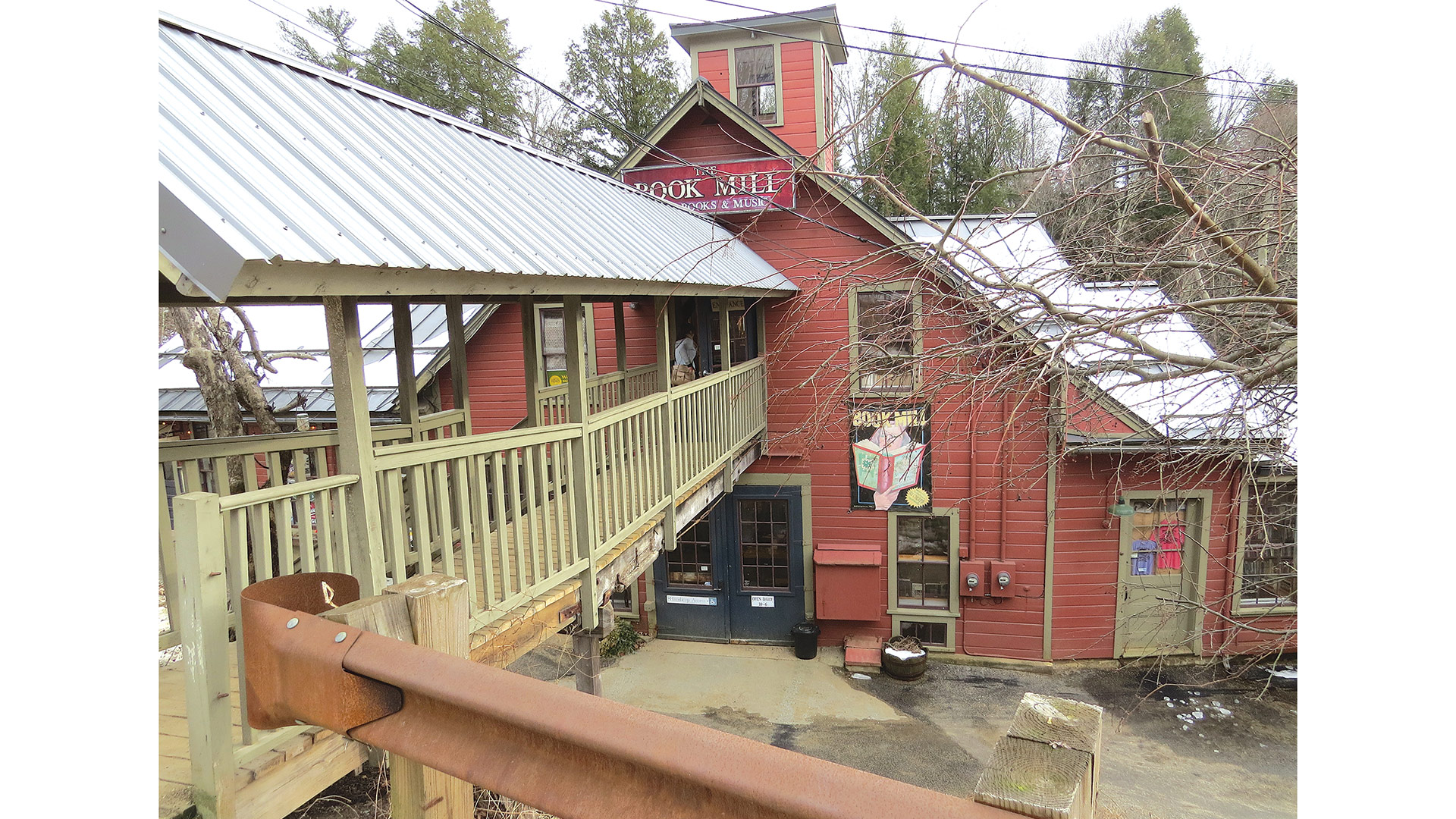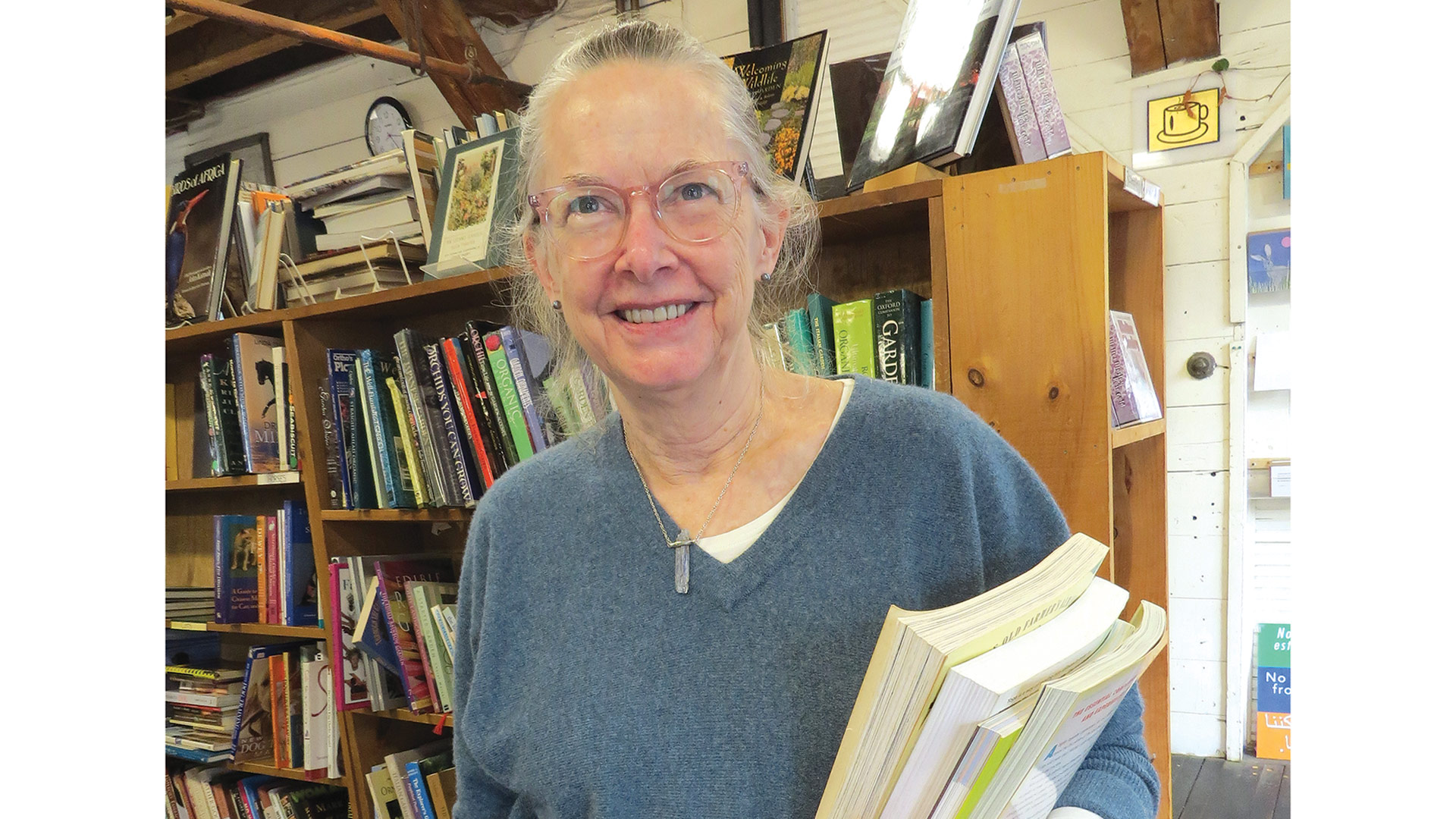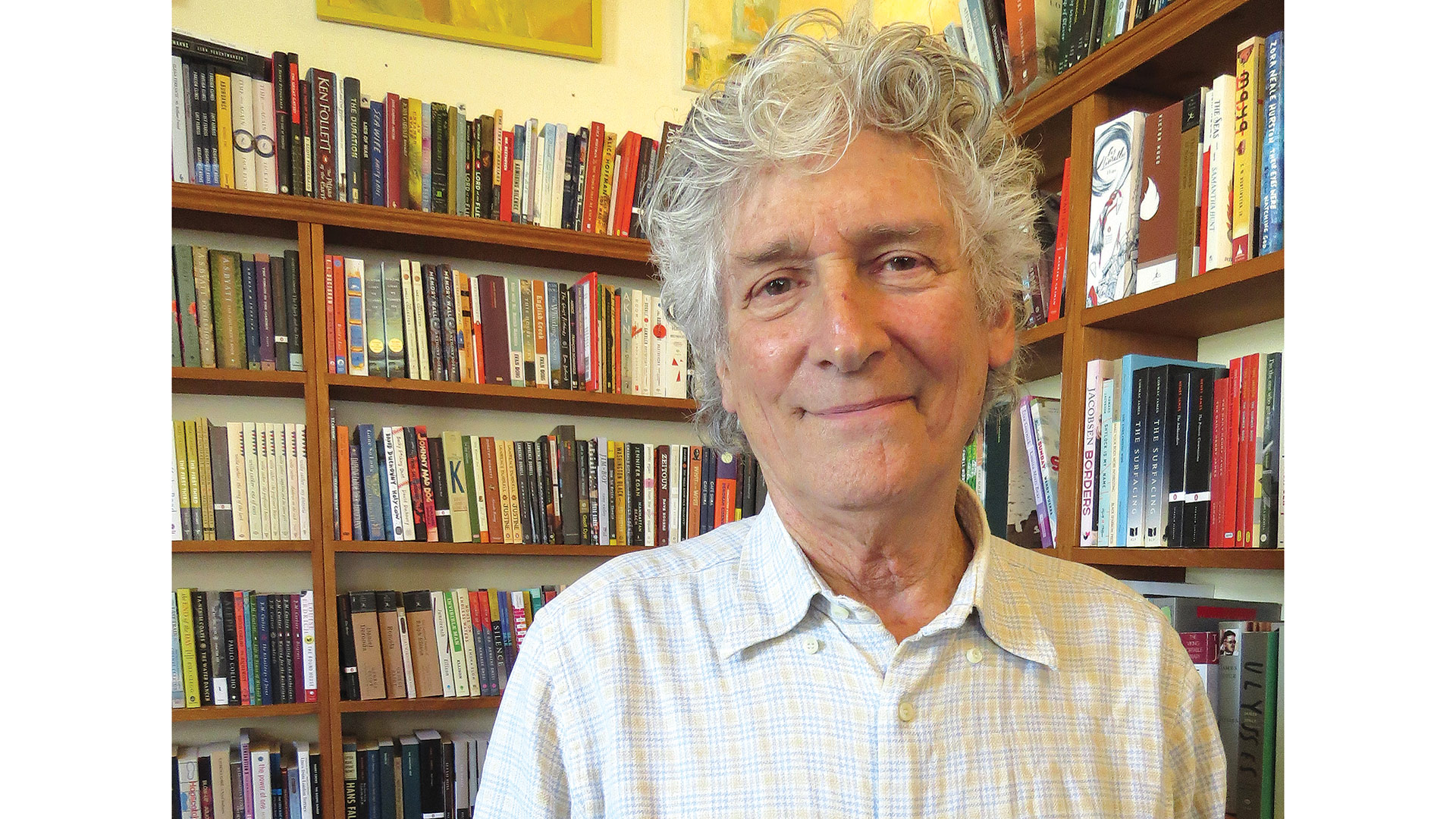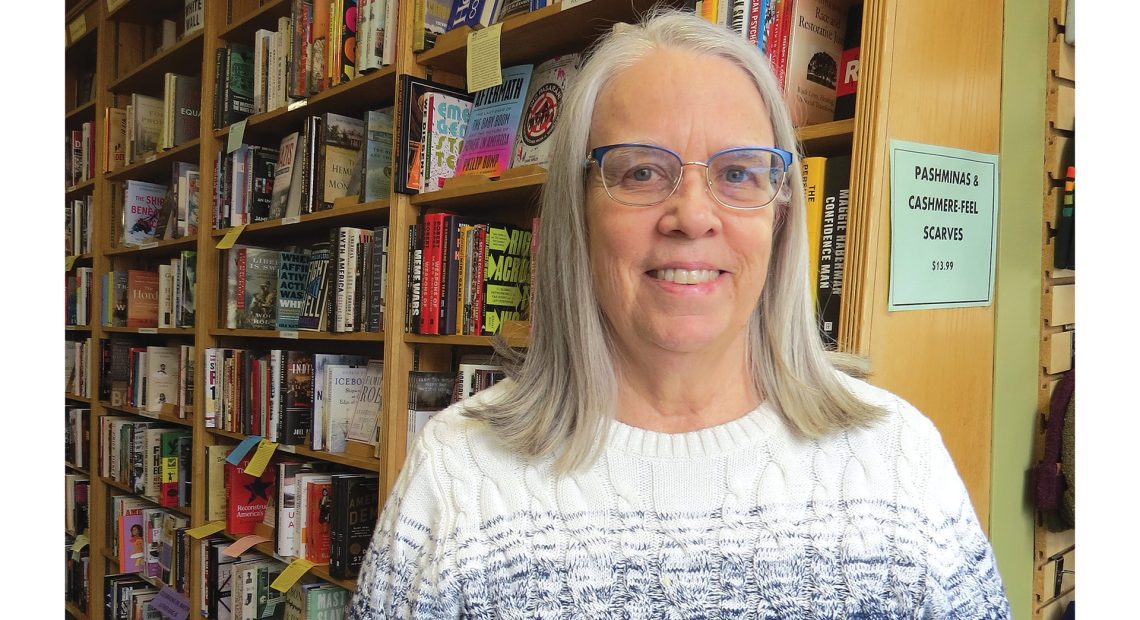Survival Stories

Joan Grenier, owner of Odyssey Bookshop in South Hadley
Joan Grenier called it “GoFundMe before there was GoFundMe.”
She was referring to a letter she sent out to friends in the South Hadley area almost 30 years ago. She couldn’t find a copy — although she believes she has one somewhere — but remembers the gist.
“I simply said, “I’m in trouble and I need your help,’” said Grenier, the second-generation owner of the Odyssey Bookshop in the Village Commons, noting that the missive was sent at a time when just about all small, independent bookstores were in pretty much the same boat she was.
The large chains were beginning to take over the book world and squeeze out their smaller competitors with their huge volumes of books, lower prices, and a maybe a latte to go with all that. Grenier — and she was certainly not alone in this exercise, to be sure — put out a call for help, asking people to support Odyssey and send money if they could.
She raised about $150,000, as she recalls, and it went a long way toward helping her navigate that whitewater and write new chapters in a story started by her father, Romeo Grenier, in 1963.
Then, in the early months of COVID, when bookstores — and most other stores as well — were forced to close their doors, Grenier launched an actual GoFundMe campaign to raise money to take the store through that time of extreme challenge and to a point where it can now celebrate its 60th anniversary.
So did Matt Tannenbaum, owner, for nearly 50 years now, of the Bookstore in Lenox, an institution that got its start in the mid-’60s in the living room of a small, rented house behind an alley that housed a café that came to be known as Alice’s Restaurant.
Tannenbaum raised more than $120,000 in a campaign that became subject material for a documentary, called Hello Bookstore, which is now streaming on Apple and Amazon Prime, and has been praised by critics as one of the best documentaries of 2022.
It tells Tannenbaum’s story, but it also tells the story of all owners of small bookstores across the country who have fought — for decades now — to keep the doors open.
“It’s a place that isn’t home and isn’t work. It’s a place where you can go and be. People come here to sit and read, they come to sit and work, students come here, professors come here to grade papers; a lot of books are written here.”
“It’s a lovely portrait of what we do here — that’s the best way to describe it,” said Tannenbaum, adding that the film portrays the bond that can, and should, exist between a community and its bookstore.
As the documentary chronicles, independent bookstores, including those in this area, have faced a continuing wave of challenges. And many have not survived, including institutions (that’s the only word for it) such as Johnson’s and Edwards in downtown Springfield, and, more recently, Big Bear Used Books and Café in Easthampton.
But overall, and to paraphrase one of the authors whose classics are sold in these landmarks, the death of the independent bookstore has been at least somewhat exaggerated.

The Bookmill in Montague operates under the slogan “books you don’t need in a place you can’t find.”
Indeed, many in this region are still … well, doing business. ‘Thriving’ might be too strong a word, but then again, most of these stores never really thrived, as Grenier and others will tell you.
But they have provided a decent living, while also providing an important service, one that is still relevant, to one extent or another, at a time when one can have the latest Louise Penny thriller delivered to their home a day after executing a few simple keystrokes.
They have survived, they said, by providing more than books on shelves — although that’s certainly a big part of it. They also provide, in many cases, a relaxing experience, an opportunity to meet authors, maybe a chance to sample a bottle of wine.
For the owners of these stores, they say what they do isn’t work as much as it is a passion, something that found them as much as they found it.
It was that way for Susan Shilliday, owner of the Bookmill in Montague, which specializes in used books and operates under the slogan “books you don’t need in a place you can’t find.”
She said she had no real intention of buying thus landmark, but then…
“It was a total, crazy fluke,” said Shilliday, who was a screenwriter before she took this gambit — Thirtysomething and Legends of the Fall are among her credits. “It was a joke with my daughters that all I really wanted in life was to come here one day and see a ‘for sale’ sign in front of the Bookmill.”
Instead of a sign, then-owner David Lovelace sent out an email in 2007 to a number of people letting them know that it was time for him to move on. One thing led to another, and Shilliday is now behind the cash register, carrying on a tradition.
For this issue, BusinessWest talked with these independent bookstore owners about the state of their business. And in the process, we get to tell some stories that are very intriguing in their own right.
It’s Not Home, and It’s Not Work
Shilliday told BusinessWest that, when she received that aforementioned email, she didn’t really know what to do with it at first.
She said she knew a lot about books, but very little, if anything, about retail or running a business. She ultimately decided that this was enough.
“It was the craziest thing I’ve ever done,” she said. “But it turned out to be one of those crazy things that turned out to be just the right thing.”
Elaborating, she said her daughter attended Hampshire College, and, following just a few trips to visit, she fell in love with the region and eventually moved here. One of her favorite things to do was visit the Bookmill, search for things to read, and, usually, settle into one of the comfortable reading chairs on site and read for a while. Make that a long while.

Susan Shilliday, owner of the Bookmill in Montague, says her store — and those like it — are an escape for people.
It was a desire to let others enjoy that experience that prompted her take the plunge, despite her lack of experience.
As businesses go, this one has a pretty simple model, she noted; it takes in books from those who don’t want or need them anymore (by appointment only), and then it sells them. Retiring professors from the Five Colleges, all within a few dozen miles or so from the store, are among the best providers of titles for the shelves, she said, adding that, on average, there are roughly 30,000 to 35,000 books on the shelves.
While most bookstores focusing on new titles have had their struggles in recent years, the Bookmill has been able to stay on a generally smoother path, said Shilliday, noting quickly that the pandemic certainly presented a number of challenges, and customers were “thrilled” when the doors were able to open again.
Overall, there are steady streams of customers to the landmark, located in an old grist mill and, later, a machine shop that, among other things, would stamp the handles of Louisville Slugger bats.
Many patrons are students or professors from the area colleges or residents of area communities, but many tourists also find the store, despite what it says in that logo that adorns bookmarks, T-shirts, book bags, and other items.
“People from this area seek it out,” she said. “And we have a lot of tourists who come in, a lot of book lovers who come in … people drive up from New York, Boston, all over; there are a lot of people who make an effort to come here.”
And perusing the shelves for books is just one of the reasons they come, she said, and this explains why the Bookmill has been able to survive and thrive over the years, and why many other stores have as well.
Indeed, she said the pandemic might have helped reinforce the importance of not only books, but bookstores as well.
“People like the community aspect of this … meeting people, discussing books with other people. That’s what we can offer people.”
“It’s a place that isn’t home and isn’t work,” she said of bookstores in general. “It’s a place where you can go and be. People come here to sit and read, they come to sit and work, students come here, professors come here to grade papers; a lot of books are written here. And that was part of the model for the Bookmill from the very beginning; it would be a place where people could come and spend time.”
Elaborating, she said that most bookstores today have other things for people to do; many have a café — the Bookmill has a small café next door, a separate operation — or another value-added proposition that makes a visit to the store an experience, or even more of an experience, as the case may be.
Buy the Book
Grenier said she has also long understood the importance of creating an experience, and not just shelves with the latest titles.
That’s why Odyssey stages several events a week, ranging from book-club meetings to regular author appearances, including the “Evening with Bernie Sanders” event staged March 13, at which he talked about, and signed copies of, his new offering It’s OK to be Angry About Capitalism.
These events are ways to bring people to the store and generate interest in books and those who write them, said Grenier, adding that it has been this way pretty much from the start, and certainly since she assumed ownership from her father in the early ’90s, after the store was destroyed by arson for the second time in two years.
She remembers what he said as he was passing the torch: “I’m not sure if I’m giving you anything more than headaches, but if you want the insurance money, we can try again.”
She decided to accept that challenge, but the intention of doing it for “a little while.”
That little while has turned into a 37-year journey that has taken the store through those myriad challenges mentioned earlier.
“There’s been a lot of change and a lot of challenge,” she said of that time, adding that the store has been reinventing itself throughout that period, and especially during the COVID years, when people couldn’t come to the store for several months and instead ordered books from the store’s website.

Matt Tannenbaum’s story became the subject of a highly acclaimed documentary film called Hello, Bookstore.
Much of this reinvention involves events, Grenier said, adding that they come in many varieties. There are several book clubs, she noted, including the Signed Editions Club, which has more than 200 members, and the Gift of Reading Club for children, as well as regular author appearances; overall, there are maybe 125 events a year.
Meanwhile, the store has become the outlet for Mount Holyoke College merchandise of all kinds, from apparel to drinkware to stationary. (Years ago, the store sold textbooks to Mount Holyoke students, but that business has changed dramatically, and it is no longer part of the equation.)
Such changes, and such evolution, are necessary, she said, because the landscape has changed, and it is harder for independent bookstores to be successful — not that it has ever really been easy.
The pandemic simply added new layers of challenge because people couldn’t come to the store, and, thus, there were no events for many months, she recalled. “The events went virtual, but it’s pretty hard to sell books at a virtual event.” What’s more, the college was closed, further reducing foot traffic. Through that GoFundMe campaign, federal assistance, and sheer perseverance, the store was able to make it through.
“If it wasn’t for the federal government, we wouldn’t be here,” she said, adding that, moving forward, the store will continue to innovate, evolve, and give people reasons to come through its doors.
“I’m very optimistic — I had to be optimistic to get through COVID,” she told BusinessWest. “People like the community aspect of this … meeting people, discussing books with other people. That’s what we can offer people.”
A Real Page Turner
Tannenbaum is equally optimistic, but then again, he always has been.
He said his store has long enjoyed what he called a “loyalty factor” that has enabled him to push through the many changes and challenges that have come to this sector.
Indeed, he recalls that, when a Barnes & Noble opened in the Berkshire Mall in Lanesborough (which closed in 2019), many of his customers responded by saying they simply wouldn’t shop there.
But he acknowledged that many in this sector have not been as fortunate because they haven’t had that same level of community support.
“We did have people who used to come in and say, ‘we used to have a bookstore like this in our town, but it closed,’” he told BusinessWest. “And we would have to bite our tongue because we knew that they did not support it, and that’s why it closed.”
He believes that community support stems from his ability to provide something other than just books. When asked to describe it, he said it’s an experience, a friendly atmosphere … something that consumers just can’t get when they order books online or when they visit the national chains.
“I like to say that Barnes & Noble sells books, but they’re not really a bookstore,” said Tannenbaum, who cut his teeth at the famous (and now-closed) Gotham Book Mart in Manhattan, adding that facilities that do fall into that category, like his, provide value in many different ways.
There are tangibles and intangibles, all of which come out in the documentary, and also in BusinessWest’s talk with Tannenbaum, during which he said nothing pleases him more than being able to connect a customer with a book.
He is still able to do that because of a GoFundMe campaign, which not only gave him the capital to remain open and actually expand his business, but generated more material for that documentary, which was originally inspired by Tannenbaum’s book My Years at the Gotham Book Mart.
Indeed, filming for that production continued all through the spring and summer of 2020, the height of the pandemic, he said, adding that it captures not just the struggles of trying to do business at that time, but the connection he had created between his store and the community — and that community’s refusal (that’s the best word to describe it) to let the story end there.
He added that the film has been good for business in many respects, but especially because it has put his store on the map.
“After the movie came out, I’ve had people visiting from all over the country,” he said. “I’m on the list of places to go; you come to the Berkshires, you go to the Norman Rockwell Museum; you come to New England, you have to go the Bookstore in Lenox, because they’re the ones they made the movie about.”
The Last Word
As she talked with BusinessWest, Grenier repeatedly flipped through a few file folders full of materials on the history of the Odyssey Bookshop — photos, newspaper clippings, and other archival material, including, she believes, a copy of that letter she sent out all those years ago — GoFundMe before GoFundMe.
She’s pulling all this together for 60th-anniversary celebrations that will begin around commencement time at Mount Holyoke and continue for the rest of the year.
There were many times during its history when a 60th anniversary seemed a long shot, and at times, maybe a really long shot.
But the store, which has certainly lived up to its name, has preserved, through fires, new and daunting competition, technology, and, yes, a pandemic.
When asked why hers wasn’t one of those bookstores that closed in the ’90s, or even more recently, Grenier said simply, “because my community supported me — people wanted a bookstore here.”
And it is this simple formula that will determine how many of these landmark facilities get to write new chapters in their intriguing stories.





